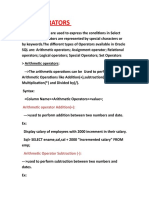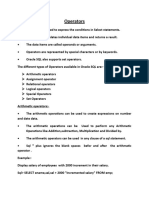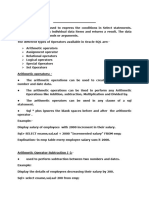0 ratings0% found this document useful (0 votes)
129 viewsOperators in SQL
Operators are used to express conditions in SQL statements and manipulate data items called operands or arguments. There are several types of SQL operators including relational, arithmetic, logical, special, boolean, and concatenation operators. Relational operators like equals (=), not equals (<>), greater than (>) and less than (<) are used to test relationships between operands. Logical operators like AND and OR are used to combine conditional statements. Arithmetic operators like addition, subtraction, multiplication and division are used to perform math operations on numeric operands.
Uploaded by
venkat manojCopyright
© © All Rights Reserved
We take content rights seriously. If you suspect this is your content, claim it here.
Available Formats
Download as TXT, PDF, TXT or read online on Scribd
0 ratings0% found this document useful (0 votes)
129 viewsOperators in SQL
Operators are used to express conditions in SQL statements and manipulate data items called operands or arguments. There are several types of SQL operators including relational, arithmetic, logical, special, boolean, and concatenation operators. Relational operators like equals (=), not equals (<>), greater than (>) and less than (<) are used to test relationships between operands. Logical operators like AND and OR are used to combine conditional statements. Arithmetic operators like addition, subtraction, multiplication and division are used to perform math operations on numeric operands.
Uploaded by
venkat manojCopyright
© © All Rights Reserved
We take content rights seriously. If you suspect this is your content, claim it here.
Available Formats
Download as TXT, PDF, TXT or read online on Scribd
You are on page 1/ 2
OPERATORS:-
-operators are used to express the conditions in sql statements.
-operators manipulates individual items and the returns a result
-The data items are calleed as operands or arguments
-operators arae represented by special chaaaarecters or key words
-oracle sql also supports set operators.
TYPES OF SQL OPERATORS:-
-Relational operators
-arithmetic operators
-logical operators
-special operotors
-boolean operators
-concatenation operators.
-----------------------------------------------------------------------------------
------
Relational operators:-
Equals to(=) operator:-
---------------------
-This operator is used to equality test.
-used to test the equality of two operands.
Ex:-
Display the details of employees whose salary is equal to 2000
SQL>SELECT* FROM employees where salary=2000;
Less than or equal to operator(<=):-
---------------------
-used for less tthan test between two operands.
Ex:-
Select * from employees where salary<=3000;
Greater than or equal to operator(>):-
-------------------------
-used for greater than test
- Ex:-
select * from employees where salary>=3000;
NotEqual to operator:-
---------------------
Not equals to (!= or ^= or <>)
ex:-
select * from employees where salary !=3000;
IN operator:-
------------
-returns true value if value is available in given list of values
-supports all types of data types
select * from employees where employee_id in(103,105,108)'
LIKE operator:-
-------------
-Used to search for pattern in a given input.
-it is supprted with charecter data only
-It uses two meta charecters.
% And _ are meta operators.
-% represents 'zero or more charecters'.
_ represents 'one charecter'
Syntax:-select * from emp where ename like '%S';(ename starts with s)
ENAME
-----
SMITH
Scott
SHIVA
select * from emp where ename like 'S%';(ename ends with s)
ENAME
-----
JONEs
ADAMs
JAMEs
select * from emp where ename like '_L%';(enames having l as 2nd
letter)
ename
-----
AlLEN
BlAKE
ClARK
IS NULL operator:-
----------------
-Used to search for NULL values in the input
-supports all types of data/
Syntax:-SELECT * FROM emp WHERE salary IS NULL;
CONCATENATION operator(||):-
----------------------
-Used in expressions to manipulate charecter strings
Ex:-'The name of employee is:'||ename
-----------------------------------------------------------------------------------
------
'LOGICAL OPERATORS':-
"AND" operators:-
-returns 'true' if both the components are true and 'false' if any of the condition
fail or both
Ex:- SELECT * FROM emp where sal>1000 AND sal<2000;
"OR" operator:-
-Returns true if the any of the condition is true,false if both are false
ex:-SELECT * from emp where sal>800 or sal>7000
'NOT' operator:-
-returns true if the condition is false
-returns false if the condition is true
-----------------------------------------------------------------------------------
---------
Arithmetic operators:-
Multiplication operator:-
-----------------------
Syntax:- SQL>select sal*2 from emp;
Division operator:-
Syntax:-SQL>select sal,sal/2 from emp;
Addition operator:-
Syntax:-SQL>select e.sal+2000 from emp e;
substraction operator:-
Syntax:-SQL>select sal-200 from emp;
You might also like
- Tuning of Industrial Control Systems 3rd Ed - Armando B. Corripio, Michael Newell (ISA, 2015)100% (3)Tuning of Industrial Control Systems 3rd Ed - Armando B. Corripio, Michael Newell (ISA, 2015)253 pages
- Database Administration and Management: SQL LabNo ratings yetDatabase Administration and Management: SQL Lab38 pages
- Structured Query Language (SQL) : - Shilpa PillaiNo ratings yetStructured Query Language (SQL) : - Shilpa Pillai64 pages
- SQL Commands:: Syntax of SQL SELECT StatementNo ratings yetSQL Commands:: Syntax of SQL SELECT Statement28 pages
- SQL Notes - Part 1 and Part 2 Merged Notes.No ratings yetSQL Notes - Part 1 and Part 2 Merged Notes.18 pages
- Structured Query Language (SQL) .: What Is DATA?No ratings yetStructured Query Language (SQL) .: What Is DATA?21 pages
- Chaper No.2 Ravindra Babasaheb Nagare DMANo ratings yetChaper No.2 Ravindra Babasaheb Nagare DMA34 pages
- Maa Corporate Training Center: Given by Mr. LoknadhNo ratings yetMaa Corporate Training Center: Given by Mr. Loknadh25 pages
- Certificate For COVID-19 Vaccination: Beneficiary Details Partially VaccinatedNo ratings yetCertificate For COVID-19 Vaccination: Beneficiary Details Partially Vaccinated1 page
- Emmidisetty Venkata Manoj: CTS ID: 2025531No ratings yetEmmidisetty Venkata Manoj: CTS ID: 20255314 pages
- Testing Shows Presence of Defects: But Cannot Prove That There Are No DefectsNo ratings yetTesting Shows Presence of Defects: But Cannot Prove That There Are No Defects4 pages
- Certificate of Completion: Flipkart Prevention of Sexual Harassment at Workplace (2019-20)No ratings yetCertificate of Completion: Flipkart Prevention of Sexual Harassment at Workplace (2019-20)1 page
- Mobile Services: Your Account Summary This Month'S ChargesNo ratings yetMobile Services: Your Account Summary This Month'S Charges2 pages
- 03082019051404nvxsmwloqt7g0ud4bh Estatement 072019 2407No ratings yet03082019051404nvxsmwloqt7g0ud4bh Estatement 072019 240712 pages
- PC 960 DataValidationOption ReleaseNotes enNo ratings yetPC 960 DataValidationOption ReleaseNotes en3 pages
- RANJITH REDDY 9642057871 CH - Ranjithreddy@yahoo - Co.in100% (1)RANJITH REDDY 9642057871 CH - Ranjithreddy@yahoo - Co.in4 pages
- PD-400424 Rev B HolterCare 11.0.1 Release NotesNo ratings yetPD-400424 Rev B HolterCare 11.0.1 Release Notes8 pages
- Big Data, The Future of Insights Summary SlidesNo ratings yetBig Data, The Future of Insights Summary Slides28 pages
- Empowerment Through Learning in A Global World - Conference 2012No ratings yetEmpowerment Through Learning in A Global World - Conference 20122 pages
- Procedure To Set Up Wired Network in Network Simulator-2No ratings yetProcedure To Set Up Wired Network in Network Simulator-260 pages
- Optimal Control: Optimal Control For Continuous Time Dynamical Systems: LQR, Minimum Time ControlNo ratings yetOptimal Control: Optimal Control For Continuous Time Dynamical Systems: LQR, Minimum Time Control5 pages
- Junior Training Sheet - Template - V5.7No ratings yetJunior Training Sheet - Template - V5.738 pages
- SAP GUI Expert Mode Setup For Mac OS - SAP Integration HubNo ratings yetSAP GUI Expert Mode Setup For Mac OS - SAP Integration Hub4 pages
- Mifii: Digital Feeder Protection With RecloserNo ratings yetMifii: Digital Feeder Protection With Recloser187 pages
- More About Handling Units in Production Planning PerspectiveNo ratings yetMore About Handling Units in Production Planning Perspective9 pages
- Data Analysis from Scratch with Python Peters Morgan - The ebook in PDF/DOCX format is available for instant download100% (2)Data Analysis from Scratch with Python Peters Morgan - The ebook in PDF/DOCX format is available for instant download58 pages









































































































